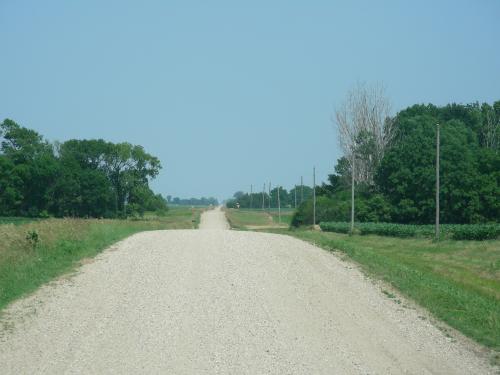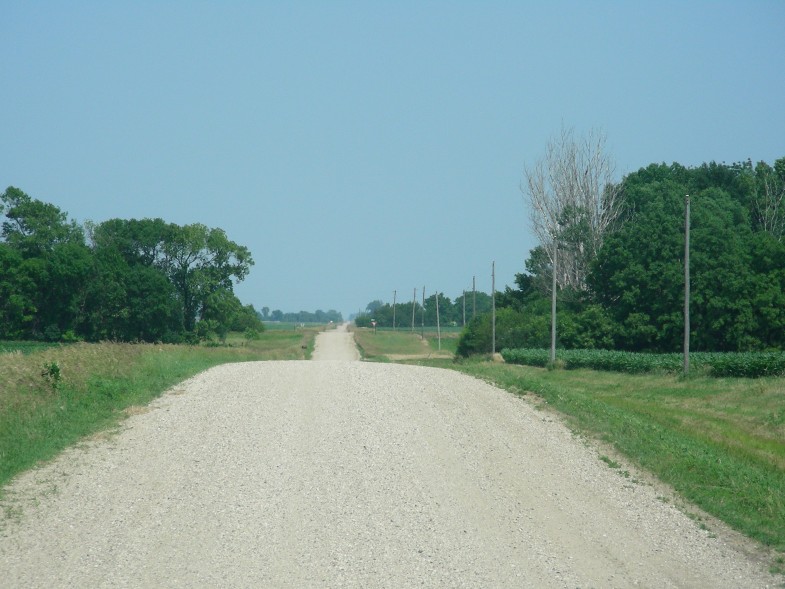Modern culture seems so steeped in the market mentality that any effort to restore the commons to our lives is seen, by definition, as a brash and controversial move. But if you take a closer look, that’s not necessarily so. The commons endures in a number of forms we take for granted today.
Walk into a restaurant, and the waiter will usually bring you a glass of water right away. This act acknowledges water as a life-giving resource that we all share in common. Simple decency demands that everyone is offered a drink to slake his or her thirst.

Photo by Jay Walljasper
I thought a lot about this tradition of interdependence over Independence Day weekend. Our family was celebrating the holiday on the farm where my wife Julie grew up, which sits two miles north of the Iowa-Minnesota border. Early on the fifth of July, I took off on my bike for a short spin around the block—four miles as blocks are measured in the country. It was a beautiful morning, with the sun casting golden light on the cornfields and butterflies flitting through tall grasses along the gravel road. So I kept on riding in the direction of towering grain elevators I saw in the distance.
When I finally made to Rake, a small Iowa town of about 200 where the grain elevators stood, I realized that I had cycled much further than I imagined on a day much hotter than I expected and had forgot to bring a water bottle. Now, I was parched.
I cruised Main Street looking for a gas station or diner or antique store or bank or anywhere I could get a drink of water. But no place was open this early on a holiday weekend.
Finally at an old gas station transformed into some kind of office, I spotted a pop machine under a huge Hillary Clinton sign left over from the Iowa caucuses six months earlier. Ah, deliverance from thirst!
Now, I am quite familiar with all the arguments against bottled water and unequivocally agree, but at this point my throat felt dangerously dry and dusty. I ran up to the machine like a wanderer in the desert coming upon an oasis, and opened my wallet. But the machine rejected my first dollar. Then rejected my second, even though it was crisp and new. My third was spat out almost immediately. So was my fourth, which was also my last. Aaaarrrggh!
What was I to do? My first instinct was to knock over the machine, bust it open with the handlebars of my bicycle, and then distribute free bottles of water to everyone in town as an act of swashbuckling heroism. But I realized my bike would suffer more from this noble plan than the pop machine. It would be a long hot walk back to my in-laws’ farm pushing a mangled bike.
It’s then I remembered the admirable commons ethic of free water. No one, not even a sweaty out-of-towner, could be refused a refreshing drink of H2O. The generous people of Rake would be proud to provide me a glass of water as a sign of their civic virtue. They probably would even add ice, I fantasized, and maybe a twist of lemon.
The problem was that no was out on this lazy Saturday morning. And I wasn’t ready to test my commons theory to the extent of knocking on strangers’ doors, especially when there was a good chance folks would still be in their pajamas. I figured it wouldn’t be too long until I saw someone out in their yard, so I patiently pedaled through the streets of Rake.
At last, I spied a man loading his car for a trip. But he was back inside before I had the chance to catch his attention. I circled the block four times in the hopes that he would return with another suitcase to deposit in the still open trunk. But he was otherwise occupied. A long good-bye, I guess.
It was time for a shift in strategy. Hmmmm. What next? Parks always have water fountains, I reasoned. So finding a park became my new quest, and I quickly discovered a little one off Main Street, not far from the railroad tracks. With a nice playground and well-kept picnic shelter, it looked like something out of a Norman Rockwell painting, sans townspeople. But no fountain was to be seen. I was sure that Rockwell would never have consented to paint a park without one.
Wait a minute—I noticed two doors on the side of the picnic shelter. Could they be… yes! restrooms. I let my bike fall to the ground and sprinted over, worried that like a lot of public places today, Rake’s restrooms would be neglected and out-of-order—a real tragedy of the commons for our times. I tried the door and it opened, good. There was a sink, good. The room smelled of fresh paint, good. And the water worked, hallelujah! I greedily gulped about a dozen handfuls of water straight from the faucet.
Stepping back into the bright sunshine, I noticed a faded metal panel on the side of the picnic shelter honoring the State Conservation Commission and the U.S. Department of Interior’s Heritage Conservation and Recreation Service for support in restoring the picnic shelter. I silently thanked them.
The role of government in sustaining the commons is a lively topic whenever commons advocates gather. Some in this broad movement view state-supported efforts to reclaim the commons with a note of skepticism, placing more hope in efforts launched by civil society groups. Others in the movement see public oversight of commons assets as a more practical tool in many instances than civil society control. No one in the movement advocates either complete government intervention in the commons or none at all. The debate is simply about where the line between government and community responsibility is best drawn.
I am not sure there is a right answer on this, and I think honest discussion of the subject only strengthens our movement. But in this case I am glad these government agencies were there to help Rake maintain its picnic shelter and help me, many years later, quench my thirst. It’s possible that the community on its own might have held bake sales and sold raffle tickets to fund repairs to the park, but no one knows for sure. I have seen plenty of places where that didn’t happen, and now water fountains are dry and restroom doors permanently locked.
Hopping on my bike for the ride back to Minnesota, I began to wonder if the Heritage Conservation and Recreation Service still existed. I never heard of it. Was it able to survive 30 years of zealous privatization and federal budget cuts to continue helping communities around the land? I looked up the agency on the Internet and found my suspicions confirmed—Ronald Reagan dismantled it in the early 1980s, although it is still remembered for accomplishments in historical and community restoration.
And yet 25 years later, the picnic shelter in Rake is in good shape with a fresh coat of paint and running water. Someone is helping maintain this commons, whether it’s the state conservation commission, Rake’s local government, 4-H kids or hardworking citizen volunteers.
And to whomever that is, I want to raise a glass of cool water and propose a toast— thank you!





